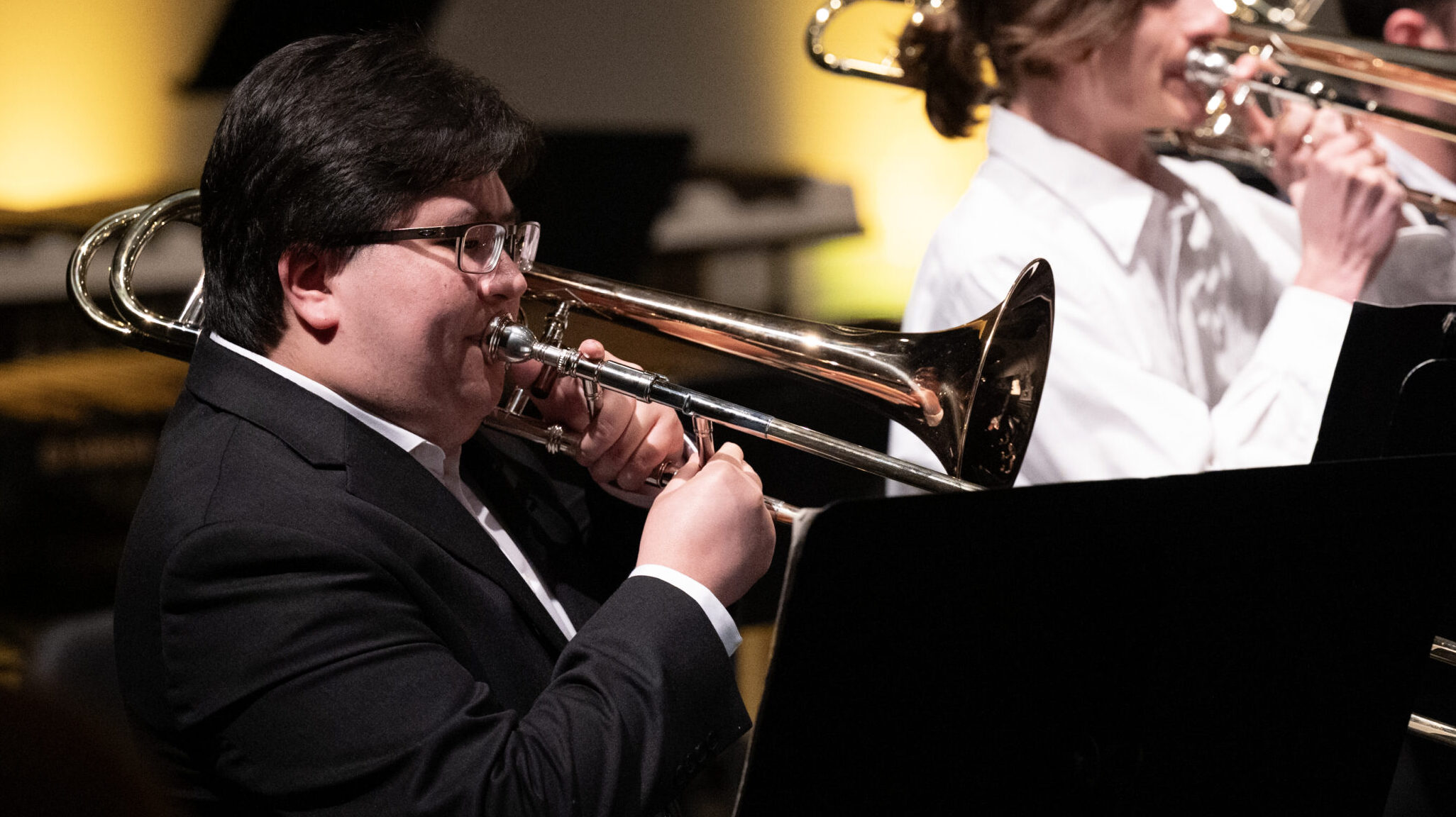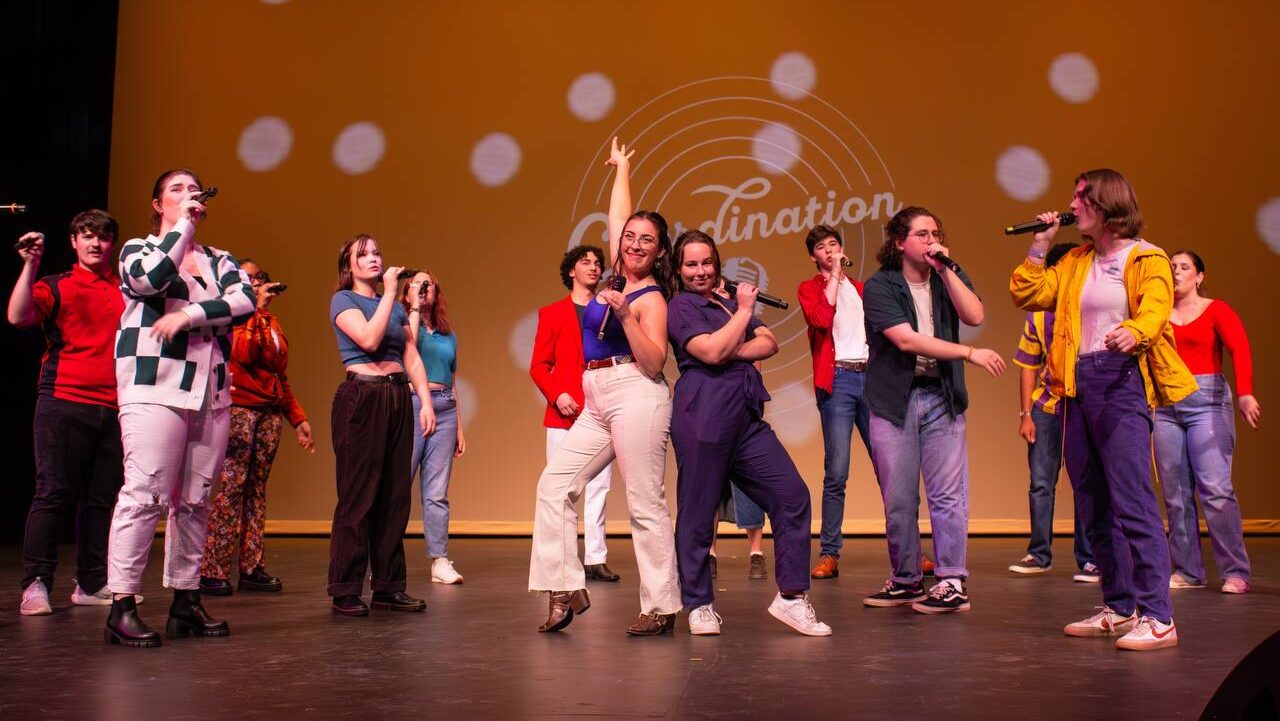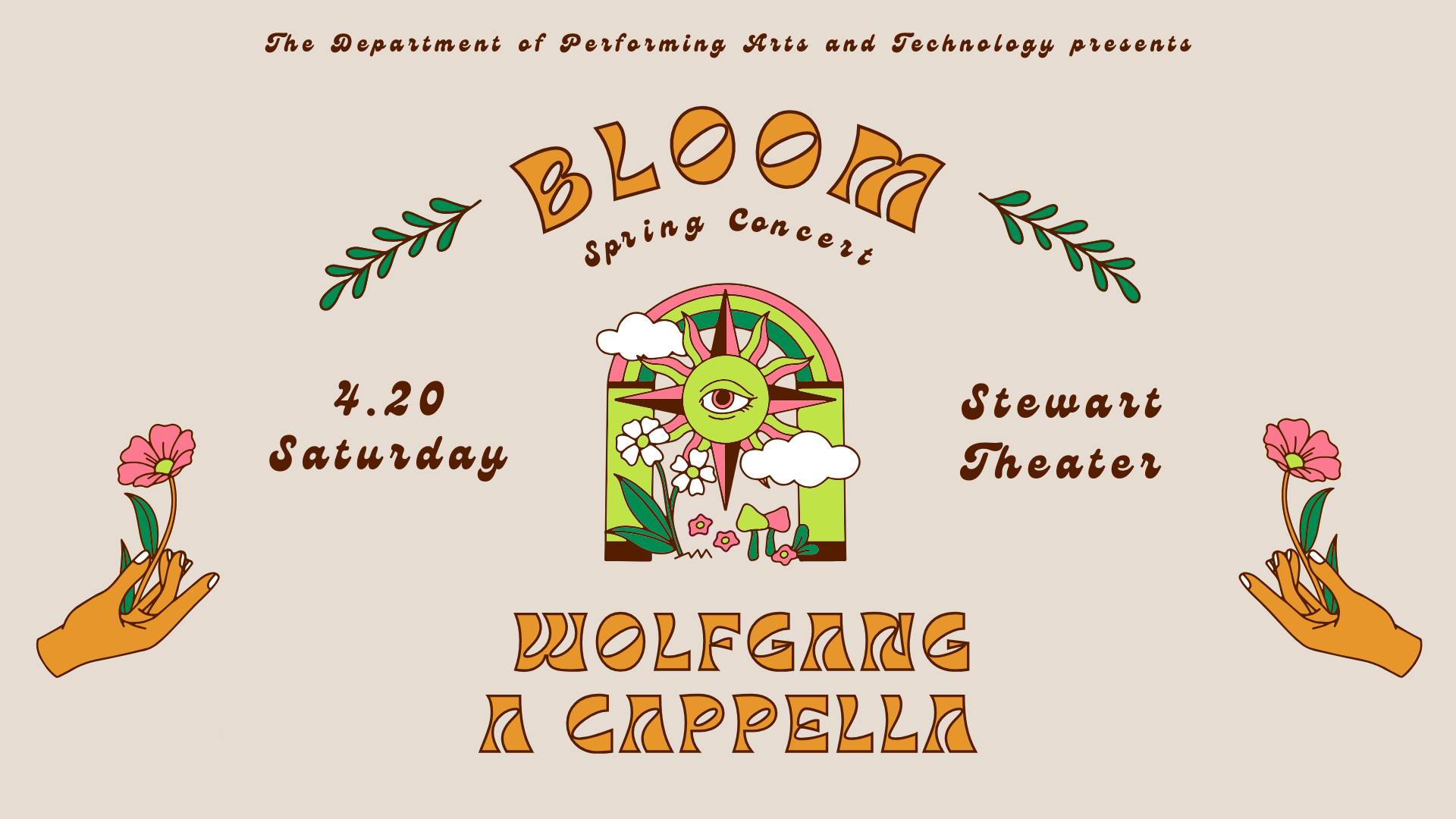Raleigh Civic Symphony: Old Worlds/New Worlds
November 20, 2022 | 4 p.m. | Stewart Theatre
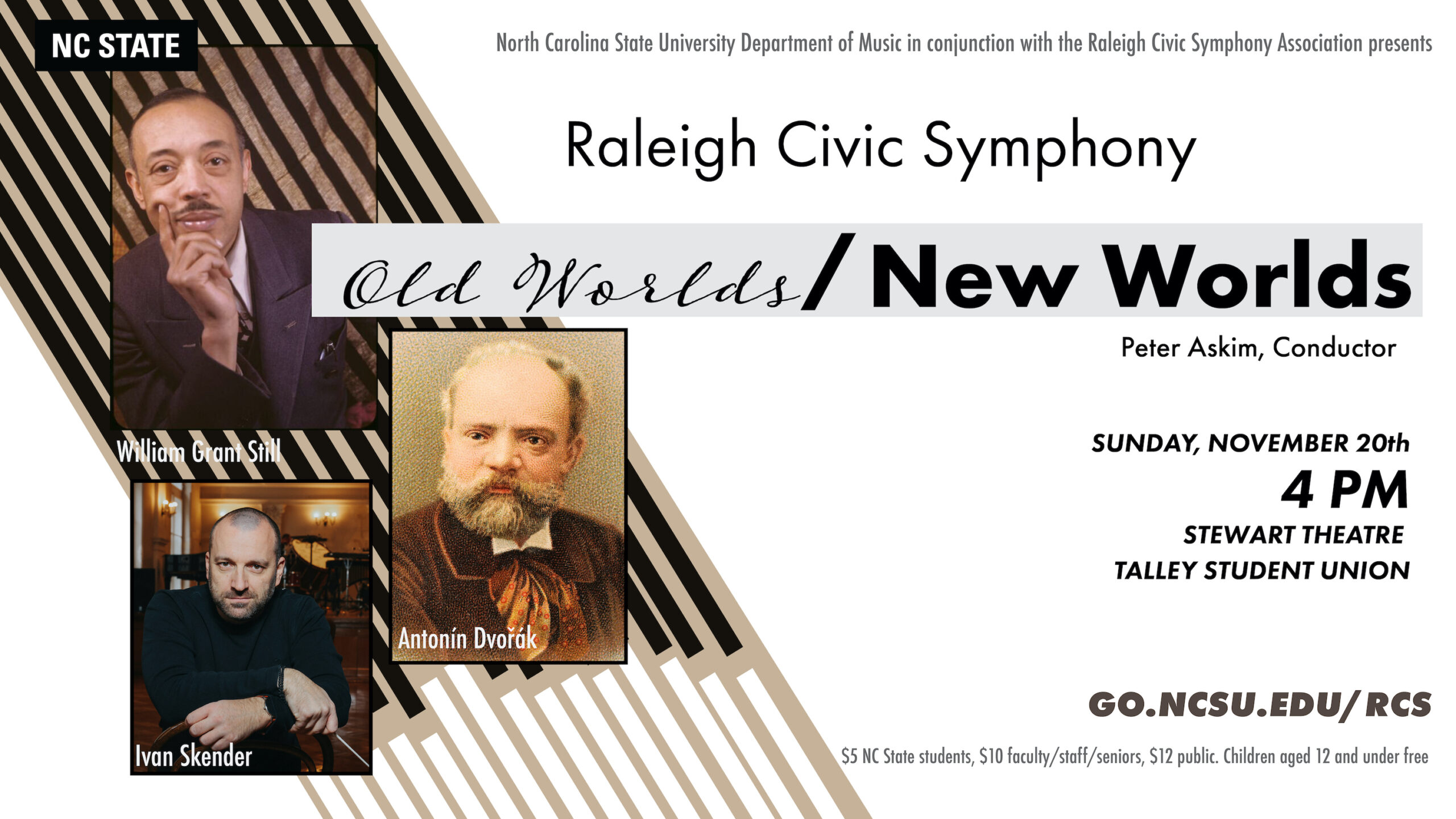
The NC State Department of Music
in conjunction with the
Raleigh Civic Symphony Association
presents
Raleigh Civic Symphony
Old Worlds/New Worlds
Peter Askim, Conductor
Program
from American Suite in A major,
Op. 98b, B. 190
- Andante con moto
- Andante
- Allegro
Antonín Dvořák
Shades and Fireworks
(World Premiere)
Ivan Josip Skender
Symphony No. 1, “Afro-American”
William Grant Still
This performance is dedicated to orchestra violinist and Raleigh Civic Symphony Association Board Member Dadan Chavis, who passed away suddenly this fall.
This program is funded in part by the City of Raleigh based on recommendations of the Raleigh Arts Commission, and by the North Carolina Arts Council, a division of the Department of Natural and Cultural Resources, with funding from the National Endowment for the Arts. www.NCArts.org
Raleigh Civic Symphony
Flute/Piccolo
Taylor James
Mary Mitchell
Laura Weislo
Oboe
Martin Brinkley
Jarrett Glass
Tom Turanchik
Clarinet
Katie Brown
Lecia Cecconi-Roberts
Charlton Holt
Shirley Violand-Jones
Bassoon
Carly Graves
Mary Merchant
French Horn
Matt Behrhorst
Zeeshawn Hasnain
Lauren LaChance
Vince Waters
Trumpet
Don Eagle
Dave Goodman
Jacob Simon
Trombone
Brian Coley
Jordan Key
Geoff Seelen
Tuba
Nelson Pardo
Percussion
Austin Fishel
Logan Merchant
Drew Moore
Harp
Winifred Garrett
Piano
Ariadna Nacianceno
Violin
Erika Atchley
Macie Benge
Josie Braddy
Andrea Danchi
Matthew Erickson
Harrison Evans
Jenny Greer
Byron Huff
Joshua Ijaola
Nimet Betul Karatas
Pranav Krishna Kumar
Emily Kumar
Liana Lessard
Kathryn Landry
Rosemary Maloney
Jaeli Marti
Anne Mouslmani
Johnathan Nguyen
Molly Puente
Lily Smith
Sean Wells
Viola
Steven Berger
Nada Elraddaf
Rajani Guditi
Andrew Hammock
John Holley
Brant Johnson
Sagar Malekar
Cello
Carson Crowley
Max DeBrino
Sonny Enslen
Denise Ferguson
Anil Gordon
Dane Kappalman
Spencer Leinbach
Jeffrey Rossman
Matti Snyder
Paul Spears
Ryma Trimech
Bass
Luke Harbour
Justin Kern
Riley Nelson
Bios
Peter Askim
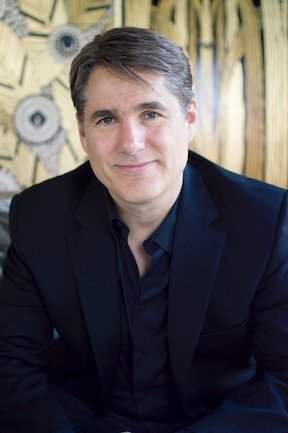
Active as a composer, conductor and bassist, Peter Askim is the Artistic Director of The Next Festival of Emerging Artists and the conductor of the Raleigh Civic Symphony and Chamber Orchestra, as well as Director of Orchestral Activities at North Carolina State University. He was previously Music Director and Composer-in-Residence of the Idyllwild Arts Academy Orchestra. He has also been a member of the Honolulu Symphony Orchestra and served on the faculty of the University of Hawaii-Manoa, where he directed the Contemporary Music Ensemble and taught theory and composition.
As a conductor, he has led the American Composers Orchestra, Knoxville Symphony and Vermont Symphony, among others, and is known for innovative programming, championing the work of living composers and his advocacy of underrepresented voices in the concert hall. He has conducted premieres by composers such as Brett Dean, Aaron Jay Kernis, Allison Loggins-Hull, Jessica Meyer, Nico Muhly, Rufus Reid, Christopher Theofanidis, Jeff Scott and Aleksandra Vrebalov, and led the American premiere of Florence Price’s Ethiopia’s Shadow in America. His work was featured on HBO and National Public Radio conducting folk-rock legend Richard Thompson’s soundtrack for The Cold Blue. He has collaborated with such artists as Miranda Cuckson, Matt Haimovitz, Vijay Iyer, Jennifer Koh, Nadia Sirota, Sō Percussion and Jeffrey Zeigler, and the bluegrass band Balsam Range. As a composer, he has been called a “Modern Master” by The Strad and has had commissions and performances from such groups as the Tokyo Symphony Orchestra, the Honolulu Symphony, the Stavanger Symphony Orchestra, Cantus Ansambl Zagreb and the American Viola Society.
With the creation of The Next Festival of Emerging Artists, Askim founded a festival dedicated to the next generation of performers, composers and choreographers. Founded in 2013, the Festival encourages young artists, ages 20-30, to focus on artistic development, entrepreneurial career strategies and the music of living composers. The Next Festival Composer and Composer/Choreographer workshops connect early-career performers, composers and choreographers in innovative and highly collaborative laboratory for the creation of new works. The Festival has been awarded grants by the Amphion, ASCAP and BMI foundations, and the Copland Fund for Music. Immediately recognizing the devastation of the COVID pandemic on young artists, he began providing free workshops, masterclasses and resources to support young artists through challenging times beginning in March of 2020. Through the Festival, he has presented over 50 Guest Artists, including Pulitzer, Grammy, and MacArthur award winners.
With the Raleigh Civic Orchestras, Askim has pioneered collaborative, multimedia concert events focused on social and environmental justice and has programmed a newly-commissioned world premiere on each concert for the last seven seasons. Themes have included Martin Luther King, Jr.’s North Carolina “I Have A Dream” speech and a work for Virtual Reality and orchestra highlighting the Women’s Suffrage Movement and the Voting Rights Act. During the pandemic, Askim premiered nine new works by composers harnessing latency and technology in innovative approaches to distance collaboration. Under his direction, the orchestras have received multiple grants recognizing diversity in programming, including from New Music USA and the Women’s Philharmonic Association.
Ivan Josip Skender
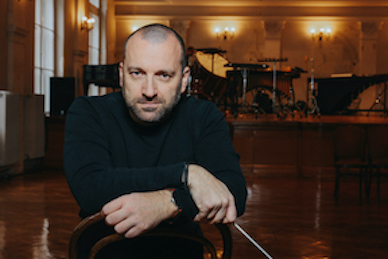
Ivan Josip Skender (Varaždin, 1981), composer and conductor, is a versatile musician with a very wide range of activities. He enrolled in composition studies in 1997 at the Academy of Music in Zagreb in the class of prof. Željko Brkanović as the youngest student of composition in the history of the Academy, and in 1999, a parallel study of conducting in the class of prof. Vjekoslav Šutej. He later expanded his skills through postgraduate studies in Vienna with Uroš Lajovic, and through seminars and workshops in composition (Michael Jarell, Joszef Soproni) and conducting (Klaus Arp, Bertrand de Billy, Zubin Mehta and others).
His wide and versatile oeuvre includes music for soloists, chamber ensembles, orchestras, choirs, music for theater performances, musicals, the opera “Stribor’s Forest” (with its 27 performances, by far the most performed Croatian contemporary opera). As a conductor, he collaborated with numerous Croatian and foreign ensembles, and the Academy Choir “Palma” won numerous awards under his leadership in Croatia and abroad. In his career as a conductor, he is particularly devoted to performances and premieres of compositions by contemporary Croatian authors, as well as foreign composers, and in 2012 the members of the contemporary music ensemble Cantus chose him as their permanent conductor.
From 2005 to 2019, he was employed at the Croatian National Theater Opera in Zagreb as a choirmaster and conductor. He was also acting director of the HNK Opera in the 2013/2014 season. Since 2009, he has been assistant professor at the Academy of Music in Zagreb in the class of Uroš Lajovic, and since 2019 he has been permanently employed at the Academy of Music as an assistant professor in the conducting department. He is the recipient of numerous awards and incentives for his artistic work. Since 2019, he has been a member of the artistic leadership of the Zagreb Music Biennale, and in 2020 he was appointed a member of the assembly of representatives of the Croatian Society of Composers.
William Grant Still (1895-1978)
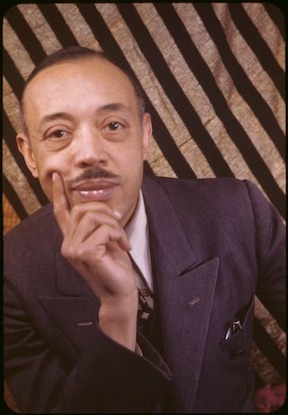
Long known as the “Dean of African-American Classical Composers,” as well as one of America’s foremost composers, William Grant Still has had the distinction of becoming a legend in his own lifetime. On May 11, 1895, he was born in Woodville (Wilkinson County) Mississippi, to parents who were teachers and musicians. They were of Negro, Indian, Spanish, Irish and Scotch bloods. When William was only a few months old, his father died and his mother took him to Little Rock, Arkansas, where she taught English in the high school. There his musical education began–with violin lessons from a private teacher, and with later inspiration from the Red Seal operatic recordings bought for him by his stepfather.
In Wilberforce University, he took courses leading to a B.S. degree, but spent most of his time conducting the band, learning to play the various instruments involved and making his initial attempts to compose and to orchestrate. His subsequent studies at the Oberlin Conservatory of Music were financed at first by a legacy from his father, and later by a scholarship established just for him by the faculty.
At the end of his college years, he entered the world of commercial (popular) music, playing in orchestras and orchestrating, working in particular with the violin, cello and oboe. His employers included W. C. Handy, Don Voorhees, Sophie Tucker, Paul Whiteman, Willard Robison and Artie Shaw, and for several years he arranged and conducted the Deep River Hour over CBS and WOR. While in Boston playing oboe in the Shuffle Along orchestra, Still applied to study at the New England Conservatory with George Chadwick, and was again rewarded with a scholarship due to Mr. Chadwicks own vision and generosity. He also studied, again on an individual scholarship, with the noted ultra-modern composer, Edgard Varese.
In the Twenties, Still made his first appearances as a serious composer in New York, and began a valued friendship with Dr. Howard Hanson of Rochester. Extended Guggenheim and Rosenwald Fellowships were given to him, as well as important commissions from the Columbia Broadcasting System, the New York Worlds Fair 1939-40, Paul Whiteman, the League of Composers, the Cleveland Orchestra, the Southern Conference Educational Fund and the American Accordionists Association. In 1944, he won the Jubilee prize of the Cincinnati Symphony Orchestra for the best Overture to celebrate its Jubilee season, with a work called Festive Overture. In 1953, a Freedoms Foundation Award came to him for his To You, America! which honored West Points Sesquicentennial Celebration. In 1961, he received the prize offered by the U. S. Committee for the U. N., the N.F.M.C. and the Aeolian Music Foundation for his orchestral work, The Peaceful Land, cited as the best musical composition honoring the United Nations.
After moving to Los Angeles in the early 1930’s, citations from numerous organizations, local and elsewhere in the United States, came to the composer. Along with them came honorary degrees like the following: Master of Music from Wilberforce in 1936; Doctor of Music from Howard University in 1941; Doctor of Music from Oberlin College in 1947; Doctor of Letters from Bates College in 1954; Doctor of Laws from the University of Arkansas in 1971; Doctor of Fine Arts from Pepperdine University in 1973; Doctor of Music from the New England Conservatory of Music, the Peabody Conservatory and the University of Southern California.
Some of the awards that Still received were: the second Harmon Award in 1927; a trophy of honor from Local 767 of the Musicians Union A.F. of M., of which he was a member; trophies from the League of Allied Arts in Los Angeles (1965) and the National Association of Negro Musicians; citations from the Los Angeles City Council and Los Angeles Board of Supervisors (1963); a trophy from the A.P.P.A. in Washington D.C. (1968); the Phi Beta Sigma George Washington Carver Award (1953); the Richard Henry Lee Patriotism Award from Knotts Berry Farm, California; a citation from the Governor of Arkansas in 1972; the third annual prize of the Mississippi Institute of Arts and Letters in 1982. He also lectured in various universities from time to time.
In 1939, Still married journalist and concert pianist, Verna Arvey, who became his principal collaborator. They remained together until Still died of heart failure on December 3, 1978. ASCAP took care of all of Dr. Still’s hospitalization until his death.
Dr. Still’s service to the cause of brotherhood is evidenced by his many firsts in the musical realm: Still was the first Afro-American in the United States to have a symphony performed by a major symphony orchestra. He was the first to conduct a major symphony orchestra in the United States, when in 1936, he directed the Los Angeles Philharmonic Orchestra in his compositions at the Hollywood Bowl. He was the first Afro-American to conduct a major symphony orchestra in the Deep South in 1955, when he directed the New Orleans Philharmonic at Southern University. He was the first of his race to conduct a White radio orchestra in New York City. He was the first to have an opera produced by a major company in the United States, when in 1949, his Troubled Island was done at the City Center of Music and Drama in New York City. He was the first to have an opera televised over a national network. With these firsts, Still was a pioneer, but, in a larger sense, he pioneered because he was able to create music capable of interesting the greatest conductors of the day: truly serious music, but with a definite American flavor.
Still wrote over 150 compositions (well over 200 if his lost early works could be counted), including operas, ballets, symphonies, chamber works, and arrangements of folk themes, especially Negro spirituals, plus instrumental, choral and solo vocal works.
Upcoming Events
- Categories:
